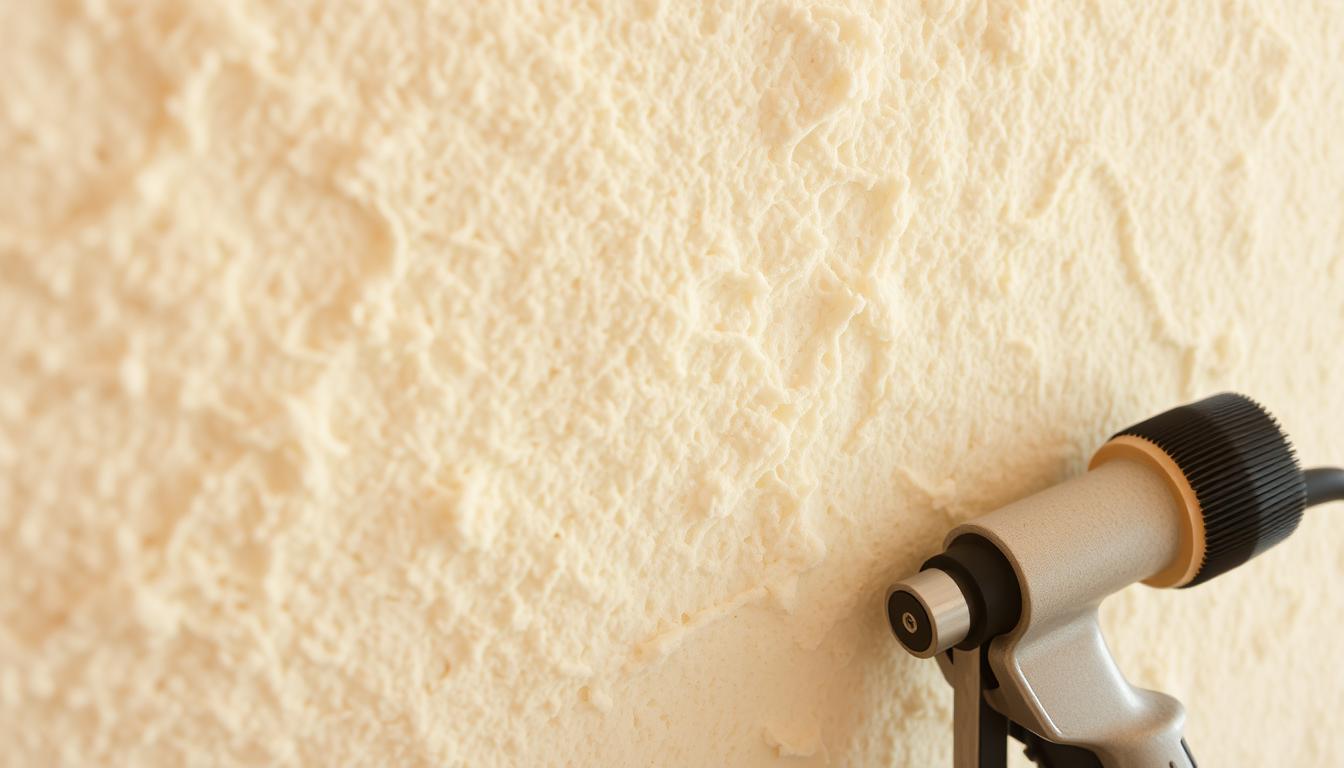Eco-Friendly Spray Foam Insulation: Is It Sustainable?
In today's construction world, finding sustainable, energy-saving materials is critical. Homeowners and builders want to lessen their environmental footprint. So, the question is: does eco-friendly spray foam insulation help?
We'll investigate this innovative insulation's benefits, its effect on the environment, and the latest developments in the field to determine whether it's a sustainable choice.
Key Takeaways
- Eco-friendly spray foam insulation offers significant energy efficiency and cost savings for homeowners.
- Using low-VOC and renewable materials in spray foam production contributes to a more sustainable construction process.
- VB Insulation, a leader in the industry, is pioneering the development of environmentally conscious insulation solutions.
- Careful consideration of factors like R-value, air sealing, and moisture management is crucial when choosing a project's eco-friendly insulation.
- The environmental impact of spray foam insulation, including its carbon footprint and lifecycle analysis, is critical to evaluate.
Understanding Sustainable Insulation
Today's world needs more energy-saving and green building materials than ever. The construction industry now focuses on sustainable practices, including new insulation solutions like spray foam.
Spray foam insulation is changing how we think about saving energy and protecting the environment.
The Need for Energy-Efficient Building Materials
The construction sector is critical in fighting climate change. Buildings use a lot of energy and release greenhouse gases. The industry is looking for ways to make buildings more energy-efficient to lessen this.
Spray foam insulation is a top choice because it keeps buildings warm and seals air leaks well.
The Rise of Eco-Conscious Construction
More people are choosing sustainable building methods. They want insulation that works well and is suitable for the planet. VB Insulation offers eco-friendly spray foam insulation to meet this demand.
Understanding sustainable insulation helps us make better choices for our buildings. The construction industry is getting greener and more efficient. This is good for our planet.
What Is Spray Foam Insulation?
Spray foam insulation is a top pick for those wanting better energy use and comfort inside. It's a liquid that turns into foam, filling gaps for a tight seal. There are two types: closed-cell and open-cell, each with its perks.
Closed-Cell vs. Open-Cell Foam Insulation
Closed-cell foam is dense and rigid, offering top-notch insulation. It has a high R-value, usually between R-5 and R-7 per inch. It also keeps water out, making it great for places where moisture is a concern.
Open-cell foam, on the other hand, is softer and more porous. It has a lower R-value, around R-3.5 to R-4 per inch. But it's more flexible and allows for better airflow, which is sometimes good.
Both types of foam are great at keeping energy costs down by stopping heat from moving. The choice between them depends on the project's needs, like moisture control and airflow.
At VB Insulation, we're all about top-notch spray foam solutions. Our team can help you choose between closed-cell and open-cell foam. We aim for a perfect fit for every project.
Read More: Closed Cell Spray Foam vs Open Cell Spray Foam
Eco-Friendly Spray Foam Insulation
Sustainability is now a big deal, and people want green building materials. VB Insulation leads the way with eco-friendly spray foam solutions. They focus on being good for the planet.
VB Insulation's spray foam is top-notch and affordable. Unlike expensive closed-cell foam, it has a high R-value and beats open-cell foam in keeping moisture and air out, making it perfect for attics and walls.
VB Insulation goes beyond making good products. They've created low-VOC and renewable insulation, which reduces harm to the environment. They're known for their green building materials.
More people want to live sustainably, and VB Insulation meets this need. Their eco-friendly insulation improves your home's energy use and air quality. It also helps the planet and supports a greener future.
The Benefits of Eco-Friendly Spray Foam
Eco-friendly spray foam insulation from VB Insulation is a top choice for sustainable buildings. It's made to save energy and protect resources, and it offers many benefits for more eco-friendly and cost-effective buildings.
Energy Efficiency and Cost Savings
VB Insulation's eco-friendly closed-cell foam is an excellent insulator. The closed-cell spray foam kit makes a tight seal that keeps heat in. This means everyone will have lower energy use and bills.
This closed-cell spray foam insulation boosts a building's energy use and saves homeowners and building owners money in the long run.
Read More: Cost of Spray Foam Insulation
Moisture and Air Barrier Properties
VB Insulation's closed-cell spray foam is also a strong moisture and air barrier. It stops moisture from getting in, protecting against water damage and mold. It's perfect for basements, attics, and commercial buildings.
Read More: Is closed cell foam air permeable?
Low-VOC and Renewable Insulation Solutions
The demand for green building materials is on the rise. The insulation industry has answered with new low-VOC and renewable spray foam options. These innovations offer top-notch insulation while keeping indoor air clean and protecting the environment.
VB Insulation leads with its low-VOC spray foam. It's made from eco-friendly ingredients that cut down on harmful VOCs. This means a healthier home for everyone. Plus, it's based on renewable, plant-based materials, which are better for the planet.
These green insulation solutions do more than help the environment. They also save energy and money. They create a strong barrier against air and moisture. This means less need for heating and cooling, which lowers bills and carbon emissions.
The trend towards eco-friendly insulation is growing. People looking to go green can find insulation that's good for the planet and their wallets. It's a win-win for both the environment and your finances.
The Environmental Impact of Spray Foam
The need for energy-saving building materials is growing. VB Insulation focuses on the environmental effects of spray foam, aiming to understand and lessen the impact of its products.
Lifecycle Analysis and Carbon Footprint
VB Insulation has investigated the environmental effects of spray foam, examining the carbon footprint of its closed-cell and open-cell foam. This includes everything from raw materials to installation and beyond.
Their studies show that closed-cell spray foam can greatly reduce energy use and emissions, making up for the carbon footprint of making and installing the insulation.
VB Insulation also uses eco-friendly, low-VOC materials in its foam, which reduces its environmental impact and makes its spray foam more sustainable.
VB Insulation is leading the way in sustainable insulation. They show that high-performance, green spray foam solutions are essential for a better future.
VB Insulation's Sustainable Approach
At VB Insulation, we know how crucial sustainable building is. We lead in eco-friendly spray foam insulation. Our goal is to make products that save energy and protect the environment.
Our team works hard to improve closed-cell spray foam insulation. We aim for the top closed-cell foam insulation R-value and closed-cell spray foam R-value. We also focus on reducing harm to the environment. Our insulation meets high standards despite some disadvantages.
We deeply analyze our products' lifecycle and carbon footprint, looking at everything from raw materials to disposal. This ensures that our closed-cell spray foam price is fair and our products are eco-friendly.
VB Insulation uses the latest technology and works with experts. We aim to offer eco-friendly insulation that works well. Our goal is to help homes and businesses while supporting a greener future.
We're proud to lead in sustainable construction at VB Insulation. Our drive for innovation and caring for the environment guides us. We strive to give our customers the best insulation products.
Choosing the Right Eco-Friendly Insulation
Choosing the proper eco-friendly insulation is critical for your project. At VB Insulation, we know how important it is to pick wisely. We focus on both energy savings and protecting the environment.
Factors to Consider for Your Project
The R-value, or thermal resistance, is a big deal. Our closed-cell foam and closed-cell spray foam products are top-notch. They keep your space at the right temperature and save energy.
Also, consider the insulation's environmental impact. Look at its carbon footprint and whether it uses renewable resources.
Cost matters, too. Our closed-cell spray foam kit and insulation specifications are affordable yet high-quality. Easy installation and a tight seal are also crucial, and our closed-cell spray foam is waterproof for these.
Consider these points to choose the best eco-friendly insulation. VB Insulation offers top-notch, eco-friendly products. We help you make your space more energy-efficient and sustainable.
Read More: What is the R-value of closed cell spray foam?
FAQ
Is spray foam insulation environmentally friendly?
Spray foam insulation's eco-friendliness depends on its type. Eco-friendly foam uses low-VOC and renewable materials. It can help lower a building's carbon footprint.
What is the most eco-friendly spray foam insulation?
The top choice is closed-cell spray foam with low VOC and renewable content. It has less environmental impact and better insulation and energy efficiency.
Why should I use closed-cell foam insulation?
Closed-cell foam insulation has many benefits. It has a higher R-value, better moisture and air barrier, and more strength. It also resists water, mold, and pests well, making it great for energy-saving and green building projects.
What is the process of closed-cell foam insulation?
Closed-cell foam is made by mixing two liquids that expand and harden. This creates a rigid, high-density foam that seals and insulates well. Proper installation requires specialized equipment and trained pros.
What are the insulation properties of closed-cell foam?
Closed-cell foam has excellent insulation, with R-5 to R-7 per inch R-value. Its high R-value and air and moisture barrier make it effective at saving energy and improving efficiency.
Does closed-cell foam need ventilation?
No, closed-cell foam doesn't need extra ventilation. It seals tightly, preventing air and moisture leaks, making it a flexible and efficient choice for many buildings.



